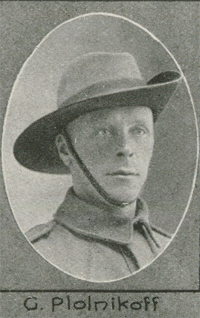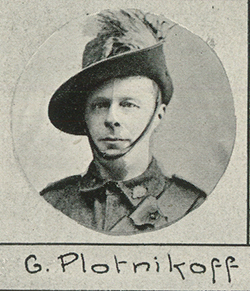George Plotnikoff
| Russian spelling | Георгий Плотников |
|---|---|
| Born | 12.01.1875 |
| Place | Ekaterinburg, Russia |
| Ethnic origin | Russian |
| Religion | Russian Orthodox |
| Family | By 1915 widower |
| Residence before arrival at Australia | Graduated from the Russian Railway Technical College and had long experience in technical work |
| Arrived at Australia |
from Far East on 5.06.1913 per Kumano Maru disembarked at Brisbane |
| Residence before enlistment | Queensland, Bundaberg |
| Occupation | Civil engineer (in Russia), labourer (in Australia) |
| Naturalisation | Served as Russian subject |
| Residence after the war | By 01.1918 Vladivostok, Tokyo, 03.1918 Brisbane; 1919 Rockhampton, 1923 Brisbane, was going to leave Australia for Russia |
Service #1
| Service number | 395 |
|---|---|
| Enlisted | 21.04.1915 |
| Place of enlistment | Bundaberg, Qld |
| Unit | 26th Battalion |
| Rank | Private |
| Place | Gallipoli, 1915; Western Front, 1916 |
| Casualties | WIA 1916 |
| Discharged | 3.01.17 in London, taking up duty with Russian Government Committee in London |
Service #2
| Service number | 53286 |
|---|---|
| Enlisted | 8.04.1918 |
| Place of enlistment | Brisbane |
| Unit | 9th Battalion |
| Rank | Private |
| Place | Western Front, 1918-1919 |
| Final fate | RTA 19.04.1919 |
| Discharged | 10.07.1919 (defective vision) |
Materials
Digitised service records (NAA)
Digitised Embarkation roll entry 1 2 (AWM)
Application for assistance (NAA)
Alien registration (NAA)
Blog article
From Russian Anzacs in Australian History:
Educated Russians returning from the front found it particularly hard dealing with the disparity between the kind of work they had done in Russia and the prospects facing them in their adopted country. George Plotnikoff, one of those who had briefly worked with the Russian government committee in London before returning to Australia, was in his forties; a former civil engineer from Siberia, he had 'finished his course in a Russian Technical School, and had a long experience in technical work'. He was a Gallipoli veteran and had been severely wounded at Pozières but, back in Australia, he re-enlisted in the AIF in April 1918 -- probably because he was unable to find work. During his second period of service his vision deteriorated and, when he was discharged, he found himself in a desperate situation. The King and Empire Alliance tried to help him and wrote to the minister for Repatriation in January 1920: 'He was offered a position by the Repatriation Department on a contract for wood cutting but as his injuries received in the war were of such a nature he could not accept the position -- his sustenance was thereupon cut out. ... He now finds himself in the position of being again without food or even a place to sleep at nights and matters look very black indeed for him in the future as on account of the Bolshevik rising in Queensland last year nobody will employ a Russian even although he be a loyal one as this man undoubtedly is.' The department responded by saying: 'This man has received every consideration and assistance from this Department and has never been satisfied with what he received. ... It is recognized that he wants money, not work, and evinces no desire to help himself.' And yet Plotnikoff did make attempts to help himself: following his discharge, he had applied for vocational training in building construction at the Rockhampton Technical College, but the course was not run. He applied for a permit to return to Siberia, where he believed he would 'immediately find employment at his own trade -- that of a Civil Engineer'; but that was refused. What the department offered him instead was 'axe, rail fare, tent and fly, blankets' to go as a labourer to Stanthorpe and then as a farm-hand to Cecil Plains, in Queensland. He did not appreciate this offer and finally, in 1923, left for Russia.
Gallery

George Plotnikoff, 1915
Queenslander Pictorial, supplement to The Queenslander, 5 June 1915, p. 27

George Plotnikoff, 1918
Queenslander Pictorial, supplement to The Queenslander, 1 June 1918, p. 26
 Russian Anzacs
Russian Anzacs